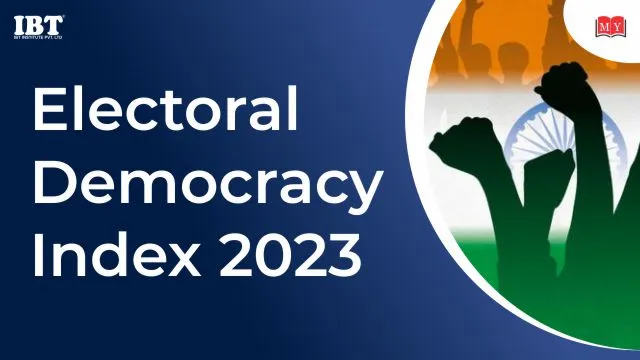
Electoral Democracy Index 2023
The Democracy Index is an index compiled by the Economist Intelligence Unit (EIU), the research division of the Economist Group, a UK-based private company that publishes the weekly newspaper The Economist. Akin to a Human Development Index but centrally concerned with political institutions and freedoms, the index attempts to measure the state of democracy in 167 countries and territories, of which 166 are sovereign states and 164 are UN member states.
The index is based on 60 indicators grouped in five categories, measuring pluralism, civil liberties and political culture. In addition to a numeric score and a ranking, the index categorizes each country into one of four regime types: full democracies, flawed democracies, hybrid regimes, and authoritarian regimes. The first Democracy Index report was published in 2006. Reports were published every two years until 2010 and annually thereafter.
India ranks 108th in the Electoral Democracy Index of the V-dem Democracy report 2023. The country ranks way below countries such as Tanzania, Bolivia, Mexico, Singapore and Nigeria. India's ranking dipped from the 100th position in 2022 to 108th this year in the report's Electoral Democracy Index (EDI) while it was 97th in the Liberal Democracy Index (LDI). Pakistan slipped two steps lower at 106th in the LDI and 110th in the EDI. The Liberal Democracy Index captures both liberal and electoral aspects of democracy based on 71 indicators such as free and fair elections, political and civil rights and more.
The US ranked 23 in the LDI while Canada and the UK occupied 24th and 20th spots, respectively. The Varieties of Democracy (V-Dem) report is based on the global dataset on democracy with over 31 million data points for 202 countries from 1789 to 2022. Here's a look at the top 10 democracies in the world. (AP Photo/Paul Sancya, File)
No 1: Denmark | The country was ranked first with the highest comprehensive score of 0.89 in the LDI. The government of Denmark respects free speech and the citizens hold full civil liberties, political rights, and voting in an environment of free and fair elections.
No 2: Sweden | The Scandinavian nation occupies the second spot in the index with a score of 0.87. The parliamentary monarchy of Sweden operates free and fair elections as well as a solid multiparty system.
No 3: Norway | Norway took the third spot on the index with a score of 0.86 in the LDI. Norway holds fair and free direct elections and various political parties represent the citizens freely. Women, minority groups, and the LGBTIQ+ community are well-represented and protected by laws.
No 4: Switzerland | Switzerland was ranked fourth in the LDI with a score of 0.85. Switzerland is known for its system of "direct" democracy which is a legal framework that enables all Swiss citizens over the age of 18 to vote on how the country is run.
No 5: Estonia | Estonia occupied the fifth spot in the index with a score of 0.85. Estonia’s democratic institutions are generally strong as both political and civil liberties are widely respected.
No 7: Belgium | Belgium occupied the seventh spot in the index with a score of 0.83. Belgium is a stable electoral democracy where political rights and civil liberties are legally guaranteed and largely respected.
No 8: Ireland | Ireland stood eighth in the index with a score of 0.82. Ireland’s government is a republic with a parliamentary democracy and its government recently made advances in civil liberties and in issues on gay rights and abortion.
No9: Costa Rica | Costa Rica is ranked ninth on the list with a score of 0.82. The country has a long history of democratic stability, and freedoms of expression and association are robust.
No 10: Finland | Finland summed up the top ten in the index with a score of 0.82. Finland’s parliamentary system has robust multiparty competition and freedoms of speech, religion, and association are respected in the country.
No 108: India | India was placed in the bottom 50 percent of the LDI index and named as one of the top 10 autocratising countries in the last 10 years by the report. However, the report added that autocratisation seems to have slowed down considerably or even stalled in some countries including India.
 4.5/5
4.5/5








